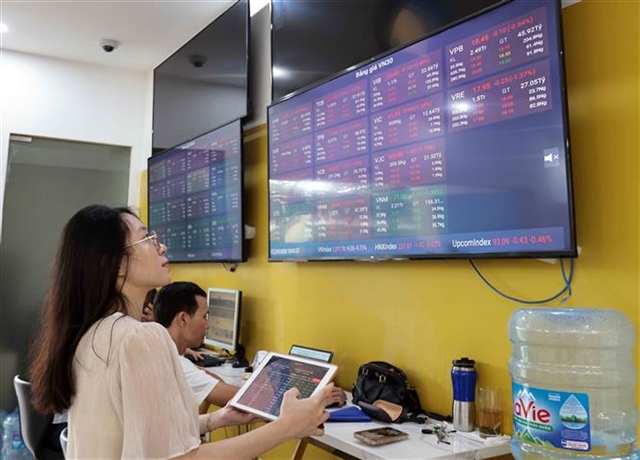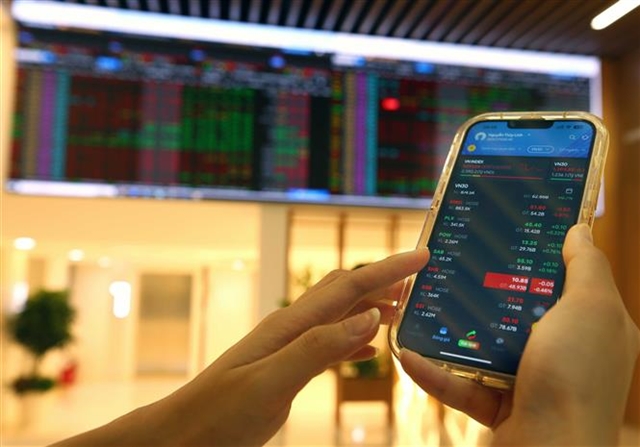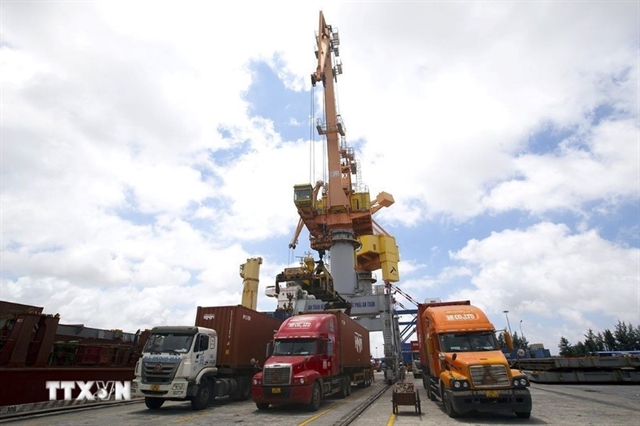 Economy
Economy

 |
| Investors watch the market's movements at a trading office of a securities firm. — VNA/VNS Photo |
HÀ NỘI — The stock market has experienced a significant transformation, marked by an increase in the number of listed companies, market capitalisation and trading value.
To align with this growth, there is a pressing need to enhance the quality of investments and commodities to meet stringent standards.
Minister of Finance Nguyễn Văn Thắng emphasised the importance of this evolution.
”To enter a new era of strong development, we need to accelerate, break through and maximise resources in 2025 to develop the economy sustainably,” he said.
“The mission of the securities sector is to continuously develop infrastructure, improve service quality, attract international investors and mobilise medium- and long-term capital for the state budget, enterprises and the economy.
“We must create a transparent, safe, and attractive investment environment, making Việt Nam’s stock market a reliable destination for both domestic and foreign investors."
Currently, the domestic stock market boasts over 9.2 million trading accounts. However, to ensure high-quality and sustainable development, there's a need to increase the proportion of institutional investors.
Deputy Minister of Finance Nguyễn Đức Chi noted that institutional investors should play a more significant role in market activities.
According to Vũ Thị Chân Phương, Chairwoman of the State Securities Commission of Việt Nam (SSC), in developed markets like South Korea and Japan, institutional investors account for about 60 per cent of market participation, whereas in Việt Nam, this figure remains low.
This imbalance leads to market volatility, heavily influenced by retail investor sentiment.
Data from securities companies showed that daily liquidity from retail investors accounts for approximately 75 per cent of market activity.
This contrasts with markets such as Hong Kong and South Korea, where retail investors often use fund certificates or entrust investments to fund managers, while direct market participation is primarily handled by professional investors.
To attract more foreign institutional investors and enhance investment capacity, the Ministry of Finance and the SSC have been diligently refining the legal framework.
The ministry issued Circular No. 68/2024/TT-BTC, effective from November 2, 2024, which removes the prefunding requirement, allowing foreign institutional investors to purchase shares without having the full amount in their accounts beforehand.
Additionally, the recently amended Securities Law, approved by the National Assembly, facilitates the participation of professional institutional investors in the market.
Nguyễn Thế Minh, Head of Research and Development Division at Yuanta Securities Việt Nam, emphasised the importance of these regulatory changes in attracting foreign capital and enhancing market stability.
He noted that the dominance of domestic retail investors in daily trading volume often leads to significant market volatility driven by the FOMO effect. By introducing a central counterparty clearing model (CCP) and inviting more institutional investors, the aim is to reduce the influence of retail investors, creating a more stable investment environment.
 |
| A stock trading app on a smart phone. — VNA/VNS Photo |
In addition to market upgrades, Minh stresses the need to enhance market quality and appeal.
Despite the potential market upgrades, foreign investors continue to sell shares. To attract back indirect foreign investors, the market should focus on adding high-quality goods and improving various aspects.
He also highlights the challenge of the Vietnamese stock market lacking quality goods, especially in delayed IPOs and state-owned enterprise equitisation.
With the recent approval of the State Asset Management Law, it is expected that from 2025 onwards, these transactions will introduce new supply sources, addressing current shortages and aiding in market stability and growth.
Nguyễn Quang Thuân, Chairman of FiinGroup, advocates for reducing state ownership where unnecessary, promoting businesses to shift to listings and enhancing corporate governance and transparency.
He added that loosening regulations will encourage foreign institutional investors, contributing to market stability.
Efforts to attract foreign institutional investors should focus on achieving national credit rating objectives, facilitating the participation of large international asset management institutions and diversifying products tailored to foreign investor preferences.
Enhancing oversight and management through professional fund management companies is also crucial, he said.
Meanwhile, Nguyễn Minh Hoàng of Việt First Securities Company said that to achieve the goal of upgrading and laying the foundation for further development, the government will continue to revise and supplement regulations regarding foreign ownership ratios, foreign investment limits and short selling.
This will facilitate the participation of foreign investors, making foreign block trades more active and accessible. — VNS




